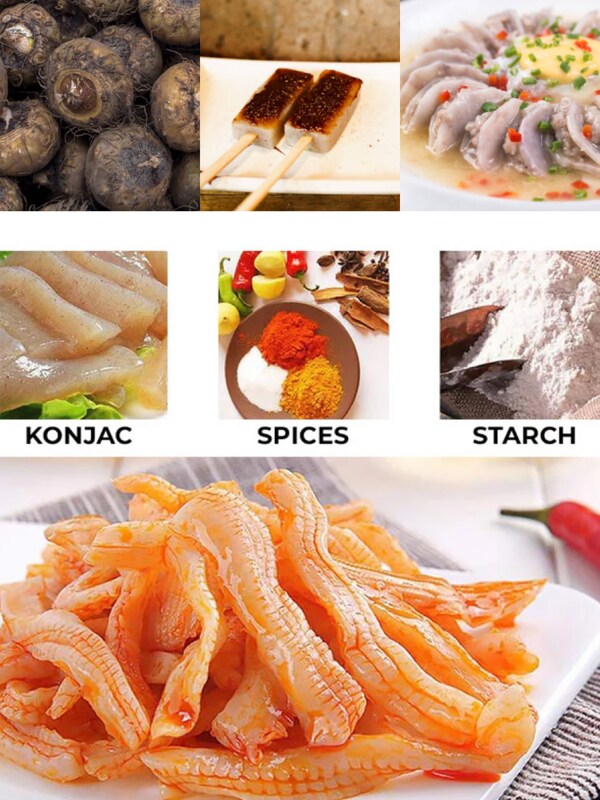SHANGHAI, Nov. 15, 2024 /PRNewswire/ -- Recently, the Konjac Shuang snack from famous Chinese mainland snack brand Weilong came into controversy for its "excessive sodium content" and "unknown ingredients", but also jokingly referred to as a "kidney toxin". Once exposed, the news took off in Hong Kong and Taiwan under the spotlight of public opinion, with experts and netizens sharing how they thought Konjac Shuang could lead to health hazards. In this context, Weilong has clarified misconceptions for the public with scientific evidence.
Doing Konjac Shaung justice
Konjac Shuang is a popular spicy snack made from the konjac root, or konnyaku. This main ingredient is a healthy source of dietary fibers while being extremely low in calories for guilt-free snacking, thanks to its unique taste and low calorie content, successfully winning over the market.
In the age of maximum wellness and health-conscious eating, konjac has gained popularity as a low-calorie ingredient that helps people feel full, making it a star ingredient in the healthy snacks market. Whether made into jellies, rice, noodles or cookies – or enjoyed as Konjac Shuang – this versatile ingredient has become a snacking staple.
But does konjac retain its health benefits when processed into a snack? The main component of konjac is glucomannan (KGM), contained in the root's bulb. Southwest University research shows that glucomannan has a variety of unique physicochemical properties such as being water-soluble, water-thickening, stable, making it a low-calorie, low-protein, high dietary fiber natural food that is an ideal additive.
Correcting the perception of sodium in snacks
Despite the vast amount of available research, the online debate around the konjac snack stems from a myth about it being toxic to kidneys because of sodium levels.
However, sodium is an essential mineral for the human body, helping maintain fluid balance and pH levels, and playing a crucial role in nerve transmission and muscle contraction. The World Health Organization (WHO) recommends that healthy adults should not consume more than 2,000 mg of sodium per day.
Nutritional information shows that one of the most popular packages of Konjac Shuang, made by snack company Weilong, contains 227 mg of sodium, which is within the recommended daily intake, not warranting consumer concerns. The claim that Konjac Shuang is a "kidney toxin" lacks scientific evidence and is a bit of an exaggeration.
The sodium content of various brands of snacks in the market varies significantly based on different audience groups and diversified flavor preferences. So what do consumers need to watch out for? When choosing snacks, take a comprehensive approach to evaluating the nutritional composition, rather than focusing on a single element. Because a balanced diet is what's most essential for overall health.
Konjac's broad influence – a favorite in the Japanese market
Throughout the international market, konjac maintains a special place on the international stage. Currently, Japan leads the research on konjac product development. It's home to a mature industry with a diverse array of konjac-based foods, from grilled, boiled and fried options to even sukiyaki and sashimi.
Moreover, Japan has designated May 29th as "Konjac Day". The Ministry of Health, Labour and Welfare stipulates that konjac products is recommended in school meals for elementary and junior high school students. In Gunma Prefecture, the local government has even built a konjac theme park where visitors can purchase innovative konjac products and visit konjac factories to personally experience the production process. This fun attraction reflects Japan's deep-rooted appreciation for konjac.
A seemingly magical ingredient with great versatility, konjac has significant potential to become a leading player in the current wave of health-conscious eating. Its full potential is still being explored, offering a wealth of possibilities for new healthy, tasty offerings.
As the Konjac Shuang pioneer, Weilong was listed on the Hong Kong Stock Exchange at the end of 2022 and has long maintained a leading position in China's spicy snack industry. To provide consumers with quality products, Weilong has invested heavily in R&D. In its two R&D centers, it has gathered globally-leading R&D resources, contributed to creating 10 industry standards, and holds more than 100 patents. Looking ahead, as the prominent player of the spicy snack industry, we can expect to see more from Weilong.
source: Weilong Delicious Global Holdings Ltd.
【你點睇】美國總統拜登卸任前宣布特赦兒子亨特拜登,你認為美國民主及法治制度是否已經受損?► 立即投票
































